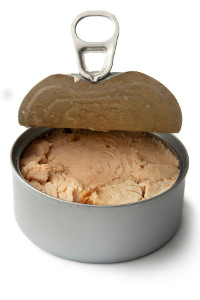 ished in the US by Consumer Reports, the magazine of Consumers' Union, has warned that canned tuna is not safe for pregnant women due to the mercury levels present and the Union said, "We encourage pregnant women to avoid all tuna."
ished in the US by Consumer Reports, the magazine of Consumers' Union, has warned that canned tuna is not safe for pregnant women due to the mercury levels present and the Union said, "We encourage pregnant women to avoid all tuna."It also said it is "particularly concerned about canned tuna, which is second only to shrimp as the most commonly eaten seafood in the United States." However it did point out that there are around 20 types of seafood that everyone can eat without worrying about mercury exposure, such as salmon, scallops, shrimp and cod.
The article appears to be in response to new guidelines issued by the US Environmental Protection Agency and Food and Drug Administration who proposed a minimum weekly fish consumption of 12 ounces for women who are pregnant, breast feeding, or trying to become pregnant, as fish is a good source of lean protein and omega-3. The guidelines were issued after a study found that many pregnant women were avoiding all fish during pregnancy which may result in babies being deficient in essential nutrients.
The FDA lists the average mercury levels in different types of fish on its website, but Consumer Reports believes that the FDA is underestimating the danger, as 20 per cent of the tuna tested had twice as much mercury as the average amount. Philippe Grandjean, an adjunct professor at the Harvard School of Public Health said that the mercury in fish consumed by a mother could reach the foetus within hours and do permanent damage.
In response to the Consumer Reports article the FDA said that it is possible for pregnant women "to increase growth and developmental benefits to their children by eating more fish." The agency added that, "This can be done while still protecting them from the potentially harmful effects of methyl mercury in fish."
Both the FDA and Consumer Reports seem to be in agreement that fish with the highest mercury levels such as swordfish, shark and mackerel should be avoided by pregnant and nursing mothers.
The US National Fisheries Institute, which represents seafood companies and restaurants, has also taken issue with the article, saying, "Though we urged CR to do a thorough, balanced and science-based job, that obviously did not happen. Minimal research would have presented reporters literally hundreds of independent seafood studies from the FDA to the World Health Organisation that clearly demonstrate the net benefit gained from eating seafood, like tuna."





